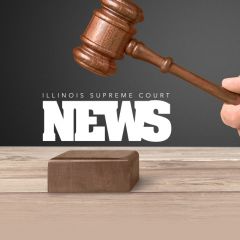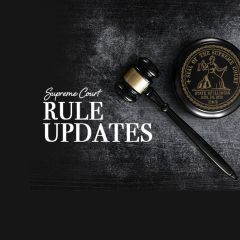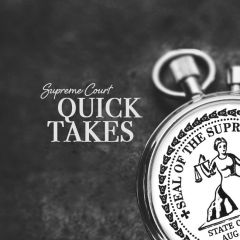The Illinois Supreme Court has appointed Drinda L. OConnor of Springfield to serve as a Commissioner of the Attorney Registration & Disciplinary Commission (A.R.D.C.) effective on January 1, 2021, and expiring on December 31, 2023. The A.R.D.C. is the Supreme Court agency that investigates allegations of lawyer wrongdoing in Illinois.
Practice News
-
December 15, 2020 |
Practice News
-
December 14, 2020 | Practice News

COVID-19 has brought new issues and questions to light when it comes to employment law. Do employers have a duty to protect their employees from viral diseases such as COVID-19? When it comes to employment law, one typically can recover under workers’ compensation. But the Workers’ Compensation Act limits the amount of damages employees can recover from employers—even when these damages are often not enough. In their December 2020 Illinois Bar Journal article, “Workers’ Comp, Negligence, and COVID-19,” past ISBA President Hon. Russell W. Hartigan (ret.) and Sarah Norkus examine how Illinois courts have held that employers must provide employees with a reasonably safe place in which to work and use reasonable care to provide for their employees’ safety. However, relying upon the Act to collect COVID-19-related damages will not be easy. And other routes may be worth pursuing when seeking negligence-related injuries on the job before moving ahead with a workers’ compensation claim.
-
December 11, 2020 | Practice News

The Illinois Supreme Court’s Volunteer Pro Bono Program for Criminal Appeals recently expanded statewide to include cases in all five appellate districts.
-
December 9, 2020 | Practice News

The Illinois Supreme Court has amended Rules 529, 530, and 531, by adding the following language to each Rule: “Per the Act, only one scheduled assessment shall be applied regardless of the number of citations issued and prosecuted together.”
-
December 9, 2020 | Practice News

Chief Justice Anne M. Burke and the Illinois Supreme Court announced today the approval of new Rule 14, which will facilitate the expansion of text messaging in Illinois courts by authorizing any Illinois court or county clerk to implement a text message notification program. New Rule 14 is effective immediately.
The Illinois Supreme Court Rules can be found online.
-
December 8, 2020 | Practice News

On December 4, 2020, after his November 3, 2020 election, Justice Neville, the second African American to sit on the Illinois Supreme Court, was sworn in by Chief Justice Anne M. Burke, with his wife and staff in attendance.
-
December 7, 2020 | Practice News

In their December 2020 Illinois Bar Journal article, attorneys Andrew R. Schwartz and John Cerney present the following scenario: Without first consulting its lawyers, your firm’s major client, Hapless Client, LLC, entered into a horrible one-sided contract with Sketchy Business, Inc. To make matters worse, Sketchy just filed a contract claim against Hapless to enforce that contract, and Sketchy’s complaint seeks massive damages that could put Hapless out of business permanently. An interview with Hapless confirms the truth of the essential allegations of the complaint. Since the complaint states a viable claim, a motion to dismiss will fail. Litigation might buy Hapless some time, but Sketchy will likely win on summary judgment. Settlement appears doubtful: Sketchy knows the strength of its case, and its settlement demand exceeds Hapless’ ability to pay. You know this desperate situation will require creative thinking and, lo and behold, your research about Sketchy shows that it has a long and colorful history in the courts, including an unsatisfied adverse judgment in favor of J. Creditor, LLC. Here, a rather unusual strategy presents itself: Purchase J. Creditor’s judgment against Sketchy. With that judgment, Hapless can then seize Sketchy’s claim, i.e. its “chose in action” against Hapless. Schwartz and Cerney outline precisely how this maneuver works (and is one based on the authors’ real-life experience).
-
December 4, 2020 | Practice News

The Illinois Supreme Court handed down five opinions on Thursday, December 3. They included opinions in two criminal cases and three civil cases.
In People v. Reed, the court answered the question of whether a guilty plea prevents a defendant from later asserting an actual innocence claim under the Post-Conviction Hearing Act. In People v. Knapp, the court considered a case in which the defendant, after his attempted murder conviction was affirmed on appeal, filed a post-conviction petition that alleged that his waiver of his right to testify was neither knowingly nor voluntarily made.
In State Farm Mutual Automobile Insurance Co. v. Elmore, the court considered the meaning and enforceability of a “mechanical device” exclusion in an automobile insurance policy that covered a grain truck used in a grain farming operation. In Gillespie v. Edmier, the court agreed that the defendant manufacturer was not entitled to summary judgment on the plaintiff’s strict product liability claims. In People ex rel. Lisa Madigan v. Stateline Recycling, LLC, the court reviewed a contempt order and remanded a case involving a civil enforcement action brought by the Attorney General under the Illinois Environmental Protection Act.
-
December 1, 2020 | Practice News

Podcasting has become serious business—and a serious means for marketing a business and developing credibility. Yet, some of the best podcasts available are produced by people who aren’t doing it for the money. Podcasting lawyers find themselves on both ends of the spectrum, including ISBA members who have dipped their toes into the still-growing medium. In its December 2020 issue, the Illinois Bar Journal asks ISBA members who podcast why they do it and what they’ve learned. The article, “Speaking Into the Mic,” also includes advice for blogging—another creative outlet that’s as popular as ever.
-
November 25, 2020 |
Practice News
The U.S. Attorney's Office for the Southern District of Illinois is seeking experienced, highly qualified attorneys for litigation and trial advocacy, with the intellect and proven ability to handle federal criminal prosecutions as an Assistant United States Attorney (AUSA) in their Criminal Division in the Fairview Heights Office.

